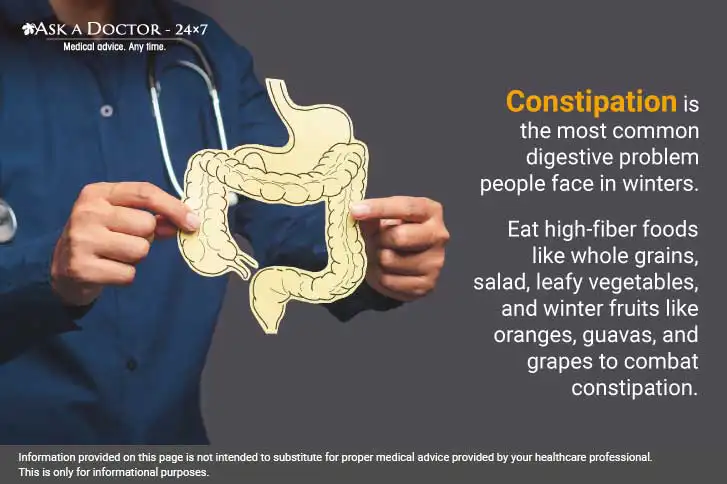Why Is Constipation More Prevalent In Winter And How To Deal With It?
Having a regular and smooth bowel movement is a critical part of digesting the food we eat. The large intestine produces stool, which is the body's method of eliminating waste. However, when an infrequent bowel movement occurs it leads to constipation. When there are less than three times weekly bowel motions and it gets difficult to pass stool and even gets painful, then this condition is called constipation.
Especially in the winter season, the complaint of constipation rises due to dehydration or even excessive consumption of beverages like coffee and tea, and also alcohol. Moreover, during the winter season, most of us crave comfort foods like fried and junk foods instead of healthy rich-in-fiber food. This results in fiber deficiency in our daily diet and in turn causes irregular bowel movements, leading to constipation. Read the article till the end to know more about constipation causes as well as some tried and tested tips to prevent this painsome condition.
The signs of constipation include:
- Less than three weekly bowel motions
- Dry, lumpy, or firm stools
- Discomfort or pain during bowel movements
- A sensation of fullness that persists even after elimination
- Bleeding in your stool
- Feeling that gas is trapped
- Headache
Common Causes of Constipation During Winter

Let’s find out the reasons why constipation is prevalent in winter:
1) Less water intake
Constipation is primarily caused by dehydration. The large intestine absorbs water as stool passes through it. Your intestines will eliminate surplus water from the stool, causing difficult-to-pass, firm, and dry stools.
2) Inadequate fiber in diet
People typically have a craving for comfort food during the winter months rather than wholesome, high-fiber foods. A person who does not get enough fiber from their diet is said to be fiber deficient. Constipation and irregular bowel movements are caused by a lack of fiber, which also supports the health of the gut and microbiome. A fiber-rich diet contributes to the bulk of your stool and functions as the colon's natural broom. Your daily intake of fiber should be between 20 and 35 grams. Hence, add fiber-rich foods, such as raw fruits and vegetables, whole grains, beans, prunes, or bran cereals to your diet regularly.
3) Increased intake of sugar
Winter is the advent of fewer daylight hours and altered sleep cycles. Additionally, eating sweet confections during this time typically results in health problems. High sugar consumption has an impact on the digestive system and can cause problems like constipation.
4) Lack of exercise
Healthy muscle tone is pivotal for regular bowel movements. People who exercise regularly generally don't develop constipation. Make an effort to work out each day. It's not necessary to exercise vigorously. All that matters is that you move frequently. A quick walk of fifteen to twenty minutes can be beneficial.
How To Prevent Constipation?

Here are a few tips you can follow this winter season to prevent constipation:
- Don’t decrease your water intake in winter. Drink at least eight glasses of water a day. Also, one should consume lukewarm water in winter to relieve constipation and aid in body detoxification
- Get sufficient fiber by including foods such as beans, bran cereals, whole grains, fruits, and vegetables in your diet. Foods from your kitchen like dates fenugreek seeds, cow milk, and gooseberry work wonders in relieving bowel discomfort
- Limit processed and fried foods as they are hard to digest and cause weight gain
- Discuss with your healthcare provider about using laxatives (medicines to treat constipation)
- Get more exercise as it keeps our body warm and fit
- Avoid alcohol consumption as alcohol can cause dehydration causing slowing of bowel emptying
- Chew your food properly
Conclusion
Constipation is not uncommon. Constipation affects about 80% of people at some point in their lives. But if it is continuous for more than 3 weeks or if there are any concerning symptoms such as blood in the stool, weight loss, or appetite reduction then consult your healthcare provider or visit a gastroenterologist. Long-term constipation should not be neglected as it can result in complications like hemorrhoids or anal fissures resulting in blood in stool.
If you have any questions related to constipation or other digestive issues, you can Consult a Doctor online at Ask a doctor, 24x7.
Recently Answered Questions Related to Constipation
- What Is The Best Treatment To Cure Constipation?
- Can Long-Term Use Of Colief Cause Any Problem?
- Chronic Constipation, Bloated Stomach, Burping, Am HIV Positive, Done Colonoscopy And Endoscopy
- What To Do For Nausea, Constipation, And Vomiting Sensation With a Negative Pregnancy Test?
- How to Improve Bowel Movements In My Breastfeeding Baby?
- How Can Constipation Or Fecal Impaction Be Diagnosed In An Elderly Person?
- Suggest Treatment For Severe Constipation, Flatulence And Gas
- Which Is The Best Medicine For Gastroenteritis?
- How To Get Cured From Constipation Completely?
Disclaimer: Information provided on this page is not intended to substitute for proper medical advice provided by your healthcare professional. This is only for informational purposes.
Ask a Specialist
Recent Questions


